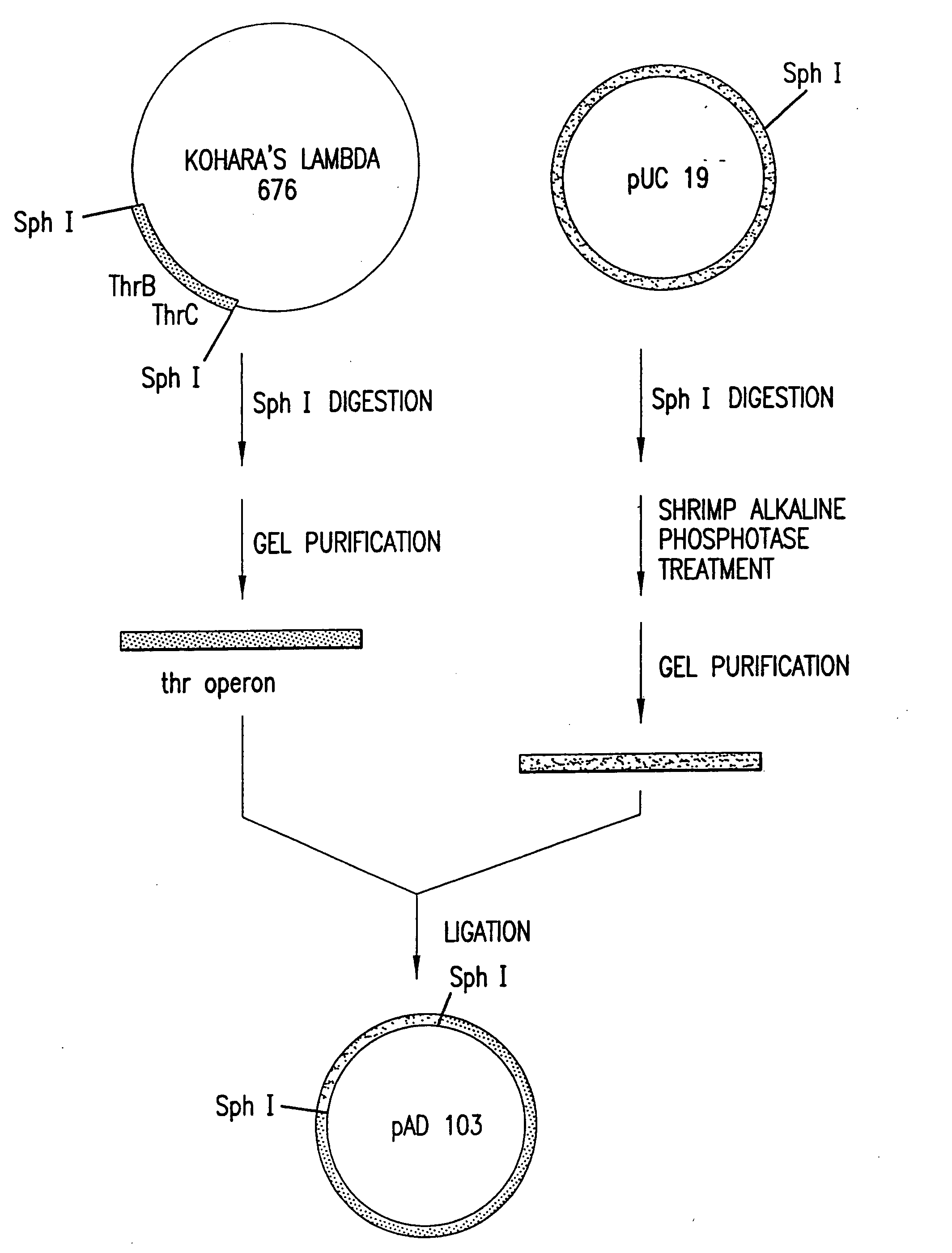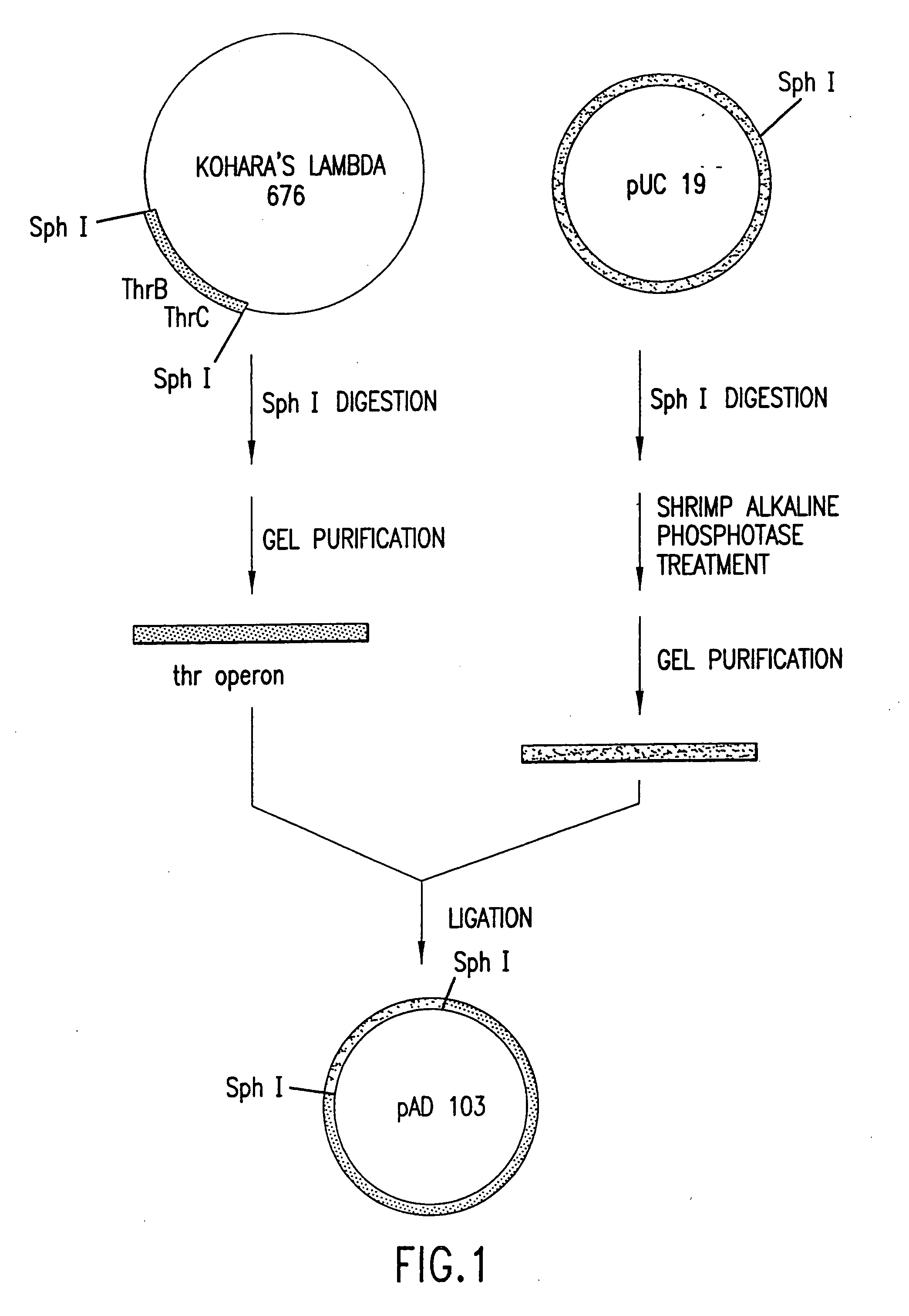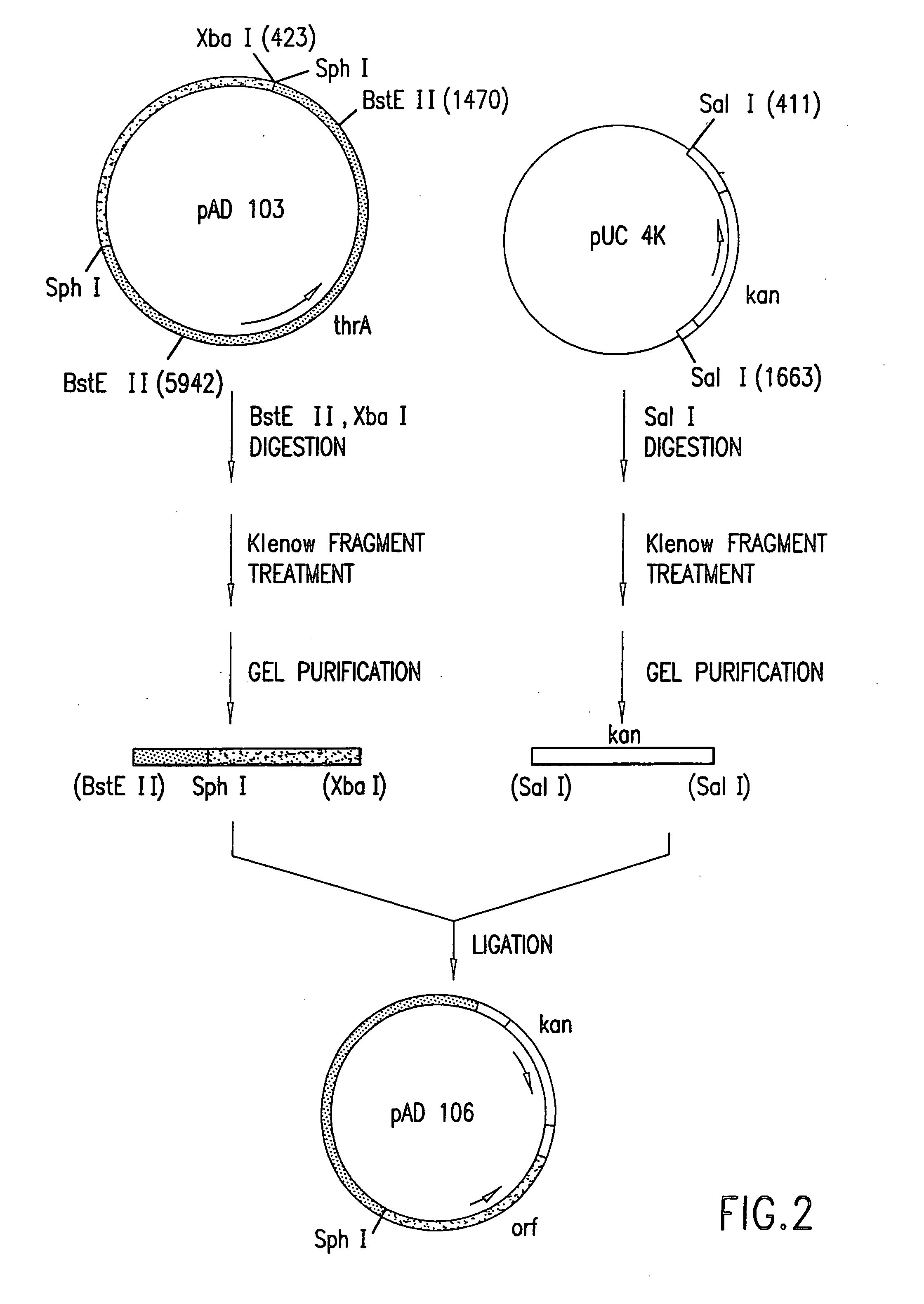Escherichia coli strains which over-produce L-threonine and processes for the production of L-threonine by fermentation
a technology of l-threonine and escherichia coli, which is applied in the field of microbiology and microbial genetics, can solve the problems of limiting the usefulness of commercial fermentative production of amino acids, limiting the usefulness of commercial fermentation of amino acids, and not commercially practical for large-scale fermentation, and achieves efficient production of amino acids and high yields.
- Summary
- Abstract
- Description
- Claims
- Application Information
AI Technical Summary
Benefits of technology
Problems solved by technology
Method used
Image
Examples
example 1
Preparation of E. coli Strain ADM Kat13
A. Transfer of the Threonine Operon of E. coli Strain ATCC Deposit No. 21277 into the Chromosome of E. coli Strain 472T23.
[0188]E. coli strain ATCC Deposit No. 21277 (U.S. Pat. No. 3,580,810), available from the American Type Culture Collection, 10801 University Blvd., Manassas, Va. 20110-2209, USA, is amino-β-hydroxyvaleric acid (AHV) resistant but requires proline, thiamine, isoleucine, and methionine to grow in a minimal medium. ATCC Deposit No. 21277 is reported to accumulate 6.20 g / L of threonine in a fermentation process. The threonine operon of ATCC Deposit No. 21277 is composed of an aspartate kinase I-homoserine dehydrogenase I gene (thrA) that encodes a feedback-resistant enzyme, a homoserine kinase gene (thrB), and a threonine synthase gene (thrC).
[0189]E. coli strain 472T23, which is deposited in the USSR Collection of Commercial Microorganisms at USSR Antibiotics Research Institute under Reg. No. BKIIM B-2307, is reported to re...
example 2
Shake-Flask Fermentation Study of Threonine Production
[0209] A comparison of threonine production among the various E. coli strains was determined by their performance in shake-flask fermentation. The strains being tested were grown on LB agar medium (10 g / L of tryptone, 5 g / L of extract, 15 g / L agar). After 1 to 2 days of growth, the cells were suspended in 5 ml of seed medium (dextrose 3.25 g / L; K2HPO4 24.35 g / L; KH2PO4 9.5 g / L; yeast extract 15 g / L; (NH4)SO4 5 g / L; MgSO4 7H2O 1 g / L) at pH 7.2. The seed was grown for 24 hours with a stirring speed of 250 rpm at 37° C. 15 ml of fermentation medium (dextrose 40 g / L; yeast extract 2 g / L; citric acid 2 g / L; (NH4)2SO4 25 g / L; MgSO4 7H2O 2.8 g / L; CaCO3 20 g / L; trace metal solution 2 ml) at pH 7.2 was then added to the seed and the fermentation process performed at 37° C. with a stirring speed of 250 rpm. After cultivation, the amount of L-threonine that had accumulated in the culture broth was analyzed by HPLC (ISCO Model 2353 pump, Ra...
example 3
Fermentation Study
[0211] The E. coli strains of the present invention and their precursor strains were tested for L-threonine production by fermentation.
[0212] G909 was tested under the following conditions. 0.5 L of aqueous culture medium containing 30 g / L of tryptic soy broth and 5 g / L of yeast extract in a 2 L baffled shake flask was inoculated with 1.5 ml of G909 and incubated on shaker at 35° C. and 200 rpm for 8.5 hours. 0.9 ml (0.03%) of the mature inoculum was added to a glass fermentator containing 3.0 L of the seed fermentor medium (10 g / L d.s of corn steep liquor, 0.4 g / L of L-isoleucine, 2.5 g / L of KH2PO4, 2.0 g / L of MgSO4 7H2O, 0.5 g / L of (H4)2SO4, 0.192 g / L of anhydrous citric acid, 0.03 g / L of FeSO4 7H2O, 0.021 g / L of MnSO4H2O and 80 g / L of dextrose). Incubation was conducted under the following conditions: a temperature of 39° C. for the first 18 hours, and then 37° C. for the duration; pH of 6.9 (maintained by addition of NH4OH); air flow of 3.5 LPM; agitation of ...
PUM
| Property | Measurement | Unit |
|---|---|---|
| temperatures | aaaaa | aaaaa |
| pH | aaaaa | aaaaa |
| temperature | aaaaa | aaaaa |
Abstract
Description
Claims
Application Information
 Login to View More
Login to View More - R&D
- Intellectual Property
- Life Sciences
- Materials
- Tech Scout
- Unparalleled Data Quality
- Higher Quality Content
- 60% Fewer Hallucinations
Browse by: Latest US Patents, China's latest patents, Technical Efficacy Thesaurus, Application Domain, Technology Topic, Popular Technical Reports.
© 2025 PatSnap. All rights reserved.Legal|Privacy policy|Modern Slavery Act Transparency Statement|Sitemap|About US| Contact US: help@patsnap.com



